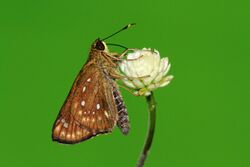Biology:Thoressa astigmata
From HandWiki
Short description: Species of butterfly
| Southern spotted ace | |
|---|---|

| |
| Scientific classification | |
| Domain: | Eukaryota |
| Kingdom: | Animalia |
| Phylum: | Arthropoda |
| Class: | Insecta |
| Order: | Lepidoptera |
| Family: | Hesperiidae |
| Genus: | Thoressa |
| Species: | T. astigmata
|
| Binomial name | |
| Thoressa astigmata (C. Swinhoe, 1890)
| |
Thoressa astigmata, the southern spotted ace,[1] is a butterfly belonging to the family Hesperiidae. The species was first described by Charles Swinhoe in 1890.[2][1] It is endemic to the Western Ghats of India and is found in the states of Kerala, Tamil Nadu and Karnataka.[1][3][4]
Description
Male. Upperside blackish-brown. Forewing with some dull ochreous hairs on the basal portion and seven semi-hyaline white spots; three small ones, subapical, in a curve, the uppermost spot very minute; two larger conjoined spots across the cell towards its end; two discal spots, one in each of the median interspaces, near their bases, the lower one usually double the size of the other and quadrate. Hindwing mostly covered with dull ochreous hairs, but without any markings. Cilia of forewing brown, becoming pale towards the anal angle of the hiudwing, whitish with grey marks opposite the vein ends. Underside as dark as it is on the upperside. Forewing with spots as above, and a very indistinct series of sub-marginal spots from the apex becoming quite obsolete hindwards. Hindwing with a rounded series of six or seven white dots in the upper disc and a double whitish mark above the anal angle. Antennae black spotted with white on the underside, the club white beneath, tip red, palpi, head and body blackish-brown, palpi beneath and pectus greyish, legs dull ferruginous. Female like the male.
Life history
The larva has been recorded on Ochlandra talbotii and Ochlandra travancorica.[5]
Gallery
References
- ↑ 1.0 1.1 1.2 Varshney, R.; Smetacek, P.. A Synoptic Catalogue of the Butterflies of India (2015 ed.). New Delhi: Butterfly Research Centre, Bhimtal and Indinov Publishing. p. 43.
- ↑ Savela, Markku (11 February 2019). "Thoressa astigmata (Swinhoe, 1890)". https://www.nic.funet.fi/pub/sci/bio/life/insecta/lepidoptera/ditrysia/hesperioidea/hesperiidae/hesperiinae/thoressa/#astigmata.
- ↑ Evans, W. H. (1949). A Catalogue of the Hesperiidae from Europe, Asia, and Australia in the British Museum. London: British Museum (Natural History). Department of Entomology. pp. 253. https://www.biodiversitylibrary.org/item/187283#page/277/mode/1up.
- ↑
 This article incorporates text from a publication now in the public domain: Swinhoe, Charles (1912–1913). Lepidoptera Indica: Volume X. London: Lovell Reeve and Co.. pp. 284. https://www.biodiversitylibrary.org/item/103495#page/298/mode/1up.
This article incorporates text from a publication now in the public domain: Swinhoe, Charles (1912–1913). Lepidoptera Indica: Volume X. London: Lovell Reeve and Co.. pp. 284. https://www.biodiversitylibrary.org/item/103495#page/298/mode/1up.
- ↑ Ravikanthachari Nitin; V. C. Balakrishnan; Paresh V. Churi; S. Kalesh; Satya Prakash; Krushnamegh Kunte (10 April 2018). "Larval host plants of the butterflies of the Western Ghats, India". Journal of Threatened Taxa 10 (4): 11495–11550. doi:10.11609/jott.3104.10.4.11495-11550. http://threatenedtaxa.org/index.php/JoTT/article/view/3104/4402.
Wikidata ☰ Q7796204 entry
 |




